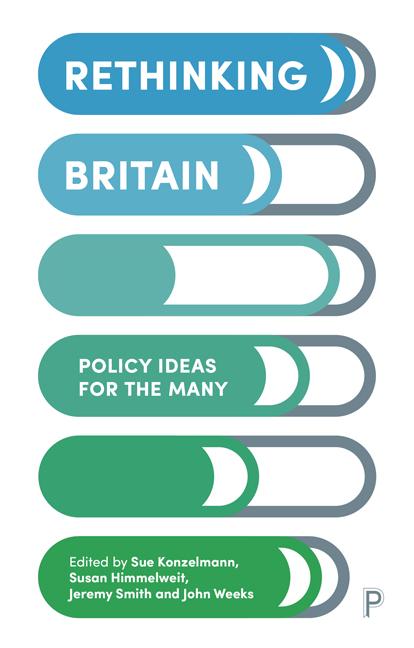Book contents
- Frontmatter
- Contents
- List of Tables and Figures
- The Contributors
- Foreword
- Introduction
- Interlude: ‘Mirror, Mirror, On the Wall – Who has the Highest Debt of All?’
- Part One Building a Full-Employment Economy: Introduction
- Part Two Public Investment – Prioritising Society Rather than Profit: Introduction
- Part Three Making Finance Work for Society: Introduction
- Part Four Genuine Social Security: Introduction
- Part Five How to provide for Social Needs: Introduction
- Conclusion
- Jargon Busters
- References and Further Reading
- Index
9 - Should we have Fiscal Rules?
Published online by Cambridge University Press: 11 March 2021
- Frontmatter
- Contents
- List of Tables and Figures
- The Contributors
- Foreword
- Introduction
- Interlude: ‘Mirror, Mirror, On the Wall – Who has the Highest Debt of All?’
- Part One Building a Full-Employment Economy: Introduction
- Part Two Public Investment – Prioritising Society Rather than Profit: Introduction
- Part Three Making Finance Work for Society: Introduction
- Part Four Genuine Social Security: Introduction
- Part Five How to provide for Social Needs: Introduction
- Conclusion
- Jargon Busters
- References and Further Reading
- Index
Summary
What's the issue?
Over the last 25 years, governments have become subject to some type of ‘fiscal rule’ for the management of public finances. Such rules set limits on government debt or budget deficits, or establish targets for reducing public debt and/or deficits.
Are ‘fiscal rules’ for public debt and budget deficits beneficial tools for controlling or helping elected governments in managing public finances?
Analysis
Since the early 1990s, a substantial group of economists have argued in favour of a macroeconomic management approach in which public finances should be legally or institutionally constrained, and the role of technocratic input in budget decisions increased.
One favoured principle in this approach is that central banks be independent of government influence or control in relation to monetary policy.
A second holds that governments be constrained by legal or self-imposed ‘fiscal rules’, which set limits on budget deficits or public debt as a share of GDP, and/or set targets for ongoing reductions. Some countries have also set up technocratic monitoring bodies known as ‘fiscal councils’. In the UK, the Office for Budget Responsibility (OBR) plays this role.
This policy of controlling or reducing governmental powers in economic and fiscal management has coincided with the period of financial liberalisation and deregulation. Prior to 1980, budget deficits tended to be low, with borrowing largely for capital investment. During the 1980s and 1990s, however, many economies’ deficits grew faster than their GDP, leading to a higher level of debt as a percentage of GDP.
Deficit bias
The principal purpose of fiscal rules is to combat ‘deficit bias’ on the part of governments. However, some arguing for hard fiscal rules have an ulterior political motivation – to reduce the size and role of government and public services. For them, the answer is almost always to cut public spending rather than raise taxation.
Many mainstream economists consider deficits the mark of ‘bad’ governments, acting against their citizens’ best interests. Deficit bias arises, they believe, from a willingness to yield to interest groups and push the burden on to future governments and generations.
But there is huge variation across time and between and within countries at different times. In reality, deficits arise from specific political and economic circumstances, not least an economic system prone to financial crises.
- Type
- Chapter
- Information
- Rethinking BritainPolicy Ideas for the Many, pp. 49 - 54Publisher: Bristol University PressPrint publication year: 2019



